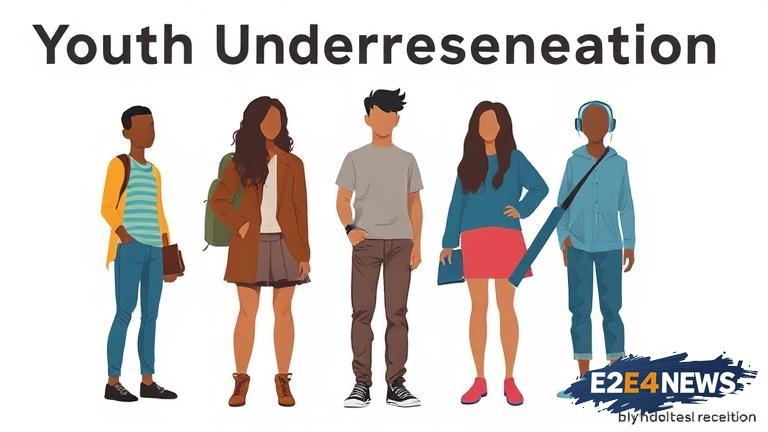A staggering statistic has come to light, highlighting the severe underrepresentation of young people in public offices. According to a recent study, individuals under the age of 30 comprise a mere 10% of public office holders. This alarming figure has raised concerns about the lack of diversity and representation in politics, with many arguing that it is essential to have a more balanced and inclusive government. The study, which analyzed data from various countries, found that the majority of public office holders are older individuals who may not fully understand or relate to the needs and concerns of younger generations. This disconnect can lead to policies that are not tailored to the needs of young people, further exacerbating the issue of underrepresentation. The underrepresentation of young people in politics is a global phenomenon, with many countries struggling to encourage and support young individuals to take on leadership roles. In some countries, the average age of public office holders is over 50, with some even exceeding 60 years old. This has led to a significant gap between the age of the population and the age of those in power. The consequences of this underrepresentation can be far-reaching, with young people often feeling disenfranchised and disconnected from the political process. Many young individuals feel that their voices are not being heard, and that their concerns are being ignored by those in power. This can lead to a lack of trust in government and a decrease in civic engagement among young people. Furthermore, the underrepresentation of young people in politics can also have a negative impact on policy decisions, with older individuals potentially making decisions that are not in the best interests of younger generations. For example, issues such as climate change, education, and healthcare may not be prioritized or addressed in a way that reflects the needs and concerns of young people. To address this issue, many experts are calling for increased efforts to encourage and support young individuals to take on leadership roles. This can include initiatives such as mentorship programs, leadership training, and campaigns to raise awareness about the importance of youth representation in politics. Additionally, governments and organizations can work to create a more inclusive and supportive environment for young people to get involved in politics. This can include providing resources and opportunities for young individuals to develop their skills and build their confidence. It is also essential to address the systemic barriers that may be preventing young people from participating in politics, such as lack of access to education and job opportunities. By working together to address these issues, it is possible to increase the representation of young people in public offices and create a more balanced and inclusive government. The study’s findings have sparked a renewed conversation about the importance of youth representation in politics, with many calling for urgent action to address this issue. As the world continues to evolve and face new challenges, it is essential that governments and organizations prioritize the needs and concerns of young people. By doing so, we can create a brighter future for all and ensure that the voices of young people are heard and valued. The issue of underrepresentation is not limited to one country or region, but is a global phenomenon that requires a collective response. Countries such as the United States, Canada, and Australia have all been affected by this issue, with many young people feeling disconnected from the political process. In response, some countries have implemented initiatives to increase youth representation, such as lowering the voting age or providing funding for youth-led organizations. However, more needs to be done to address this issue and ensure that young people have a seat at the table. The consequences of inaction could be severe, with a lack of representation leading to a lack of trust and engagement among young people. This, in turn, could have far-reaching consequences for the health and stability of democracies around the world. Ultimately, it is up to governments, organizations, and individuals to work together to address the issue of underrepresentation and create a more inclusive and supportive environment for young people to participate in politics.





